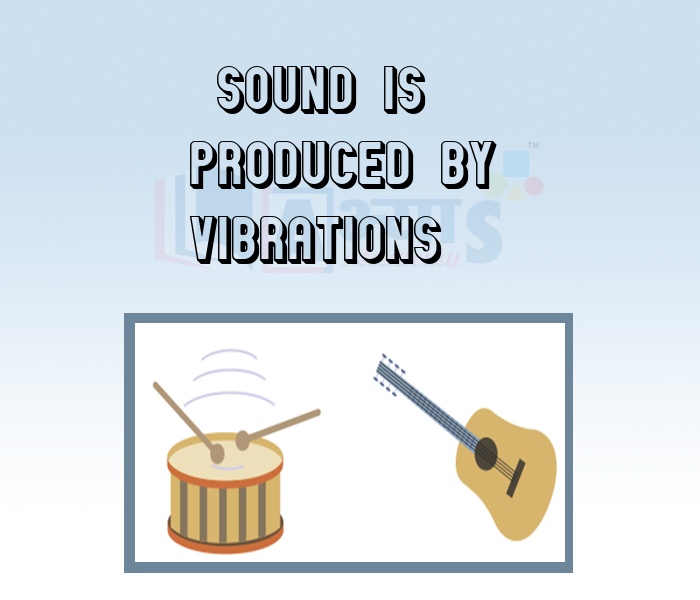Sound is produced by Vibrations












Sound is produced by Vibrations
Sound: We think of the word ‘sound’ whenever we have a sense of hearing in our ears. We, therefore, say that sound is a form of energy which produces the sensation of hearing in our ears. The sound can be produced by striking, shaking, blowing, rubbing or plucking, different objects. A close look at these situations shows that we actually set one or another objects, into vibrations. It is these vibrations that produce sound. Whenever a source produces a sound, there are always some vibrations linked with it. We can, therefore think of vibrations as the basic cause of all sounds.`Vibration: The to and fro or back and forth motion of an object is called vibration.
How sound is produced: A sound is produced because of a vibration. Thus, sound is a vibration that is capable of being heard. The organ in human beings that is involved in the production of sound is the larynx (commonly called the voice box). The voice box is situated in the neck at the upper end of wind pipe. The sound produced is controlled by vocal cords, which are thin membranes stretched across the voice box. There are muscles attached to the vocal cords. These muscles can vary the tension in the vocal cords (i.e., make them tight or loose). With the help of these muscles, we can make different sounds.The vocal cord in men are about 20 mm long and in women they are 15 mm long.
A vibrating body : | |||
| Right Option : C | |||
| View Explanation | |||
The maximum possible displacement of a vibrating body from its mean position during its motion is equal to ____________ | |||
| Right Option : B | |||
| View Explanation | |||
A string is streched over two rigid supports and a weight of 1 kgwt is suspended from one of its free ends and then it is plucked. If the length of string over two rigid supports is decreased and plucked again, then the frequency of sound produced ______________________ | |||
| Right Option : B | |||
| View Explanation | |||
Students / Parents Reviews [10]
One of the best institutes to develope a child interest in studies.Provides SST and English knowledge also unlike other institutes. Teachers are co operative and friendly online tests andPPT develope practical knowledge also.

Aman Kumar Shrivastava
10thAbout Abhyas metholodology the teachers are very nice and hardworking toward students.The Centre Head Mrs Anu Sethi is also a brilliant teacher.Abhyas has taught me how to overcome problems and has always taken my doubts and suppoeted me.

Shreya Shrivastava
8thA marvelous experience with Abhyas. I am glad to share that my ward has achieved more than enough at the Ambala ABHYAS centre. Years have passed on and more and more he has gained. May the centre flourish and develop day by day by the grace of God.

Archit Segal
7thBeing a parent, I saw my daughter improvement in her studies by seeing a good result in all day to day compititive exam TMO, NSO, IEO etc and as well as studies. I have got a fruitful result from my daughter.

Prisha Gupta
8thIt was good as the experience because as we had come here we had been improved in a such envirnment created here.Extra is taught which is beneficial for future.

Eshan Arora
8thMy experience with Abhyas is very good. I have learnt many things here like vedic maths and reasoning also. Teachers here first take our doubts and then there are assignments to verify our weak points.

Shivam Rana
7thMy experience was very good with Abhyas academy. I am studying here from 6th class and I am satisfied by its results in my life. I improved a lot here ahead of school syllabus.

Ayan Ghosh
8thI have spent a wonderful time in Abhyas academy. It has made my reasoning more apt, English more stronger and Maths an interesting subject for me. It has given me a habbit of self studying

Yatharthi Sharma
10thMy experience with Abhyas academy is very good. I did not think that my every subject coming here will be so strong. The main thing is that the online tests had made me learn here more things.

Hiya Gupta
8thIt was a good experience with Abhyas Academy. I even faced problems in starting but slowly and steadily overcomed. Especially reasoning classes helped me a lot.
